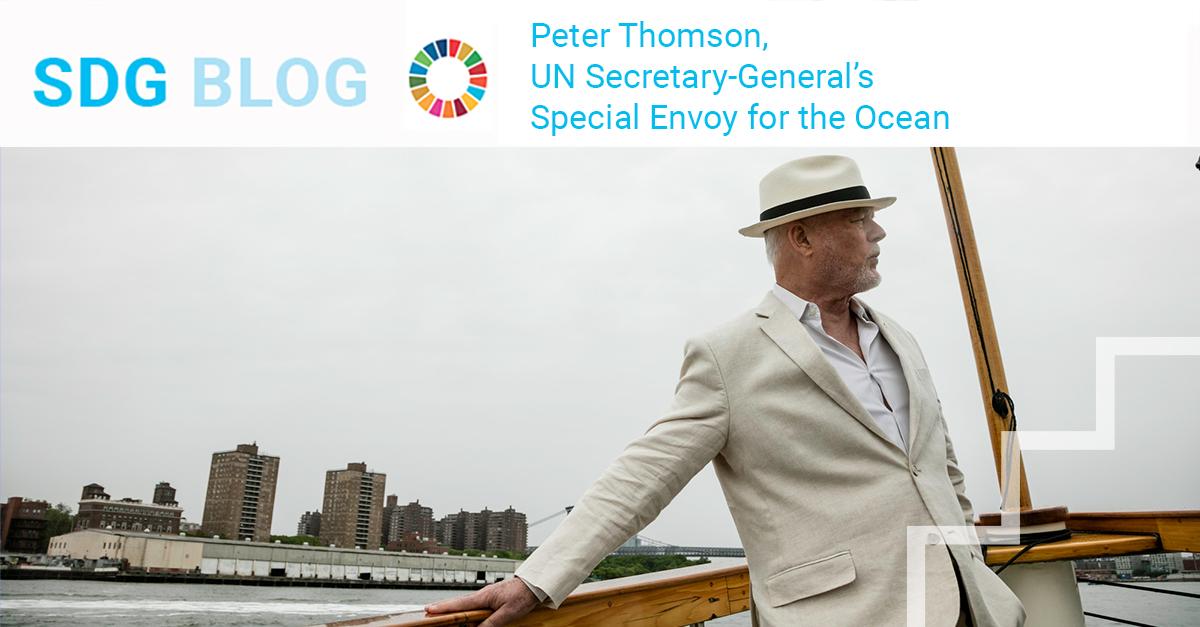SDG Blog

Ride the Rising Wave to the 2022 UN Ocean Conference
By Ambassador Peter Thomson, UN SG’s Special Envoy for the Ocean
By now you would all have heard the mantra, there can be no healthy planet without a healthy Ocean, and the Ocean’s health has been measurably in decline for some time now. We need to take to heart that all of us have been party to driving the decline in the Ocean’s health. Thus, we all have a role to play in developing and implementing the solutions.
For the future security of our species on this planet, it is vital, in the true sense of the word, that we stop the decline and work to restore a healthy Ocean. Before describing the big events over the next six months that will all be working on that turn-around, I urge you to consider what your contribution will be? I urge you to discuss this with family and friends, in your communities and workplaces.
As an overarching starting point, your consideration might take up the need for all of our societies to govern our activities with a logical and ethical dedication to sustainability. I believe the time has come to accept that linear exploitation of finite planetary resources is a dead-end street, and that we have reached a point on humanity’s path whereupon global transformation to circular recycling systems of production and consumption has become a straight-forward matter of survival. I see this as the great transformational challenge facing us in the 21st Century, a tectonic transformation akin to when human societies moved from the Stone Age to the Bronze Age.
Turning to the international events of the next six months. There is a wave that is building, one that that will sweep around the world over the six months, carrying with it the science-based solutions that will make the next UN Ocean Conference the seminal moment we need in order to stop the decline of the Ocean’s health. Co-hosted by the governments of Kenya and Portugal, the conference will be held in Lisbon from June 27th to July 1st, 2022. It is mandated by all 193 UN Member States to scale up Ocean Action for the implementation of SDG14, based on those science-based solutions, and on partnerships and the power of innovation. I have no doubt that, like the first UN Ocean Conference in 2017, the Lisbon conference will prove to be a game-changer for Ocean Action around the world, guided by that wise trio of science, innovation and partnerships.
The building wave rises in Brest on the north-west coast of France, where President Macron will host the One Ocean Summit from 9th to 11th February. A week later, the governments of Palau and the US will co-host the Our Ocean Conference in Palau. Every effort is being made to synchronize the content and outcomes of these conferences so that they are carried forward on the wave of solutions as it continues to build.
Then, in Nairobi, at the UN Environment Assembly in the first week of March, attention will turn to the mandating of an internationally binding treaty to combat plastic pollution. Around that time, it’s also expected that the postponed WTO Ministerial Meeting will be held in Geneva, where it is expected that Member States will finally agree to ban the scourge of harmful fisheries subsidies.
In March in New York, the fourth negotiating session of a UN agreement on the conservation and sustainable use of marine biodiversity beyond national jurisdiction (BBNJ) gets underway. And then, in Kunming, China, at the UN Convention on Biological Biodiversity’s COP15, we hope to see the adoption of a target to conserve 30% of the planet’s surface by 2030.
In June in Geneva, as a direct result of the excellent progress that was made on the Ocean-Climate nexus issues at the UNFCCC COP 26 in Glasgow, the UNFCCC SBSTA will be considering these critical issues a few weeks before we meet at the UN Ocean Conference in Lisbon. Meanwhile over the next six months a plethora of business, civil society and scientific conferences are being held at global, regional and national levels, all concerned to see progress in our universal aim of safeguarding the Ocean’s well-being.
The build-up of this wave of multilateral activity on Ocean action is unprecedented, and so it should be. For in describing Ocean-Climate nexus issues as critical, I mean to emphasize that they are inextricably linked to the future of human security. The massive scale at which we burn fossil fuels, creating the greenhouse gases that blanket our atmosphere, are commensurately changing the composition of the Ocean. The Ocean has absorbed 90 per cent of the heat from global temperature rises, so it should not be a surprise that immense changes are underway within it and that we now witness such phenomena as the death of coral reefs. It is tragic to contemplate that if present global warming trends continue, the 21st Century will witness widespread saltwater engulfment of low-lying land, of atolls, and river deltas, that have for thousands of years been home to biodiversity, food production and unique manifestations of human culture.
There are many causes for the decline in the Ocean’s health, including overfishing, habitat destruction and the pollution we inflict, ranging from noise to chemicals to plastic and everything in between. But lest there remain doubt in anyone’s mind, the central fact is that the great nemesis driving the decline in the Ocean’s health is humankind’s continuing burning of fossil fuels. In the name of intergenerational justice, it is time to stop that folly.
 Welcome to the United Nations
Welcome to the United Nations